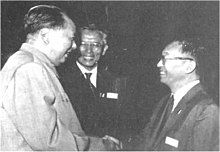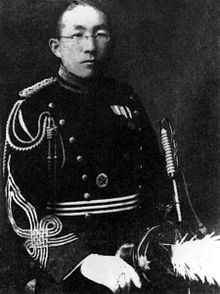Mao Zedong thanking Japan controversy
You can help expand this article with text translated from the corresponding article in Chinese. (May 2021) Click [show] for important translation instructions.
|
Mao Zedong, the longtime Chairman of the Chinese Communist Party and the founder of the People's Republic of China, was reported to have expressed his gratitude to the Japanese military and political figures who visited China in the 1950s and 1970s. Mao said that the Japanese invasion of China had united Chinese people and allowed the Chinese Communist Party to win the Chinese Civil War. In the 21st century, these remarks by Mao caused strong reactions on the internet in China. With the 2020 Hong Kong Diploma of Secondary Education Examination (HKDSE) history subject controversy on the historical understanding of Japan's invasion of China,[1][2] these remarks have returned to the spotlight on Hong Kong and mainland Chinese websites.[3] The word "thanks" expressed by Mao has been also interpreted by some observers as dark humour.[4][5]
Controversial remarks excerpts
[edit]
When Chairman Mao Zedong talked with former Japanese Lieutenant General Saburo Endo, who visited China in 1956, he said "You are also our gentlemen, and we want to thank you. It is really you who have fought this war, educated the Chinese people and united the scattered Chinese people, so we should be grateful to you."[6][7]

In 1960, when Mao Zedong spoke to a Japanese literary delegation, he mentioned, "I spoke to many Japanese friends about this incident, and some of them said that it was not good for Japan to invade China. I said of course the invasion was bad, but we should not look at this bad side alone, on the other hand, Japan has done us a great favour in China. If Japan had not occupied half of China, the Chinese people would not have awakened. In this respect, we have to "thank" the Japanese Imperial Army. Who is educating you Japanese people now? It is the U.S. imperialists who are your negative teachers, and they are also our negative teachers. ......It is possible and necessary for our two peoples, China and Japan, to cooperate because both are oppressed by U.S. imperialism and have common positions."[8][9]
In 1961, Mao Zedong told Japanese Socialist Party advisor Shūnō Kuroda: "......occupied most of China in the past, so the Chinese people received an education. Without the Chinese War of Resistance against Japan, the Chinese people would not have been enlightened nor would they have been united, so that we would still be in the mountains and would not be able to go to Beijing to see Peking Opera. It was because the Japanese imperial army had occupied most of China and there was no other way out for the Chinese people that they became aware and started armed struggle, establishing many anti-Japanese bases and creating the conditions for victory in the subsequent war of liberation. The Japanese monopoly capital and warlords did a 'good deed' for us, and I would like to thank the Japanese warlords if I need to thank them." In the conversation, Mao also expressed the meaning that "the relationship with the people should be treated differently from the relationship with the government" and that "the monopoly capitalist government and militarists in Japan should be responsible, but the Japanese people should not be responsible."[10][11]
On 9 July 1964, Mao Zedong talked with the visiting delegates from Asia, Africa, and Oceania to China who attended the Second Asian Economic Symposium about Sanjuro Nango: "After our liberation, a Japanese capitalist named Sanjuro Nango talked to me once and said, 'I am very sorry that Japan has invaded you.' I said, 'No, if Japanese imperialism had not launched a massive invasion and overrun half of China, the entire Chinese people would not have been able to unite against imperialism and the Chinese Communist Party would not have won.' In fact, Japanese imperialism served as a good instructor for us. First, it weakened Chiang Kai-shek; second, we developed the Communist-led bases and armies. Before the war, our army had reached 300,000, but due to our own mistakes, it was reduced to more than 20,000. In the middle of the eight-year war, our army grew to one million two hundred thousand men. You see, didn't Japan do us a great favour? This favour was not done by the Japanese Communist Party, but by Japanese militarism. Because the Japanese Communist Party did not invade us, but the Japanese monopoly capital and its militarist government invaded us.[12][13][14]
On 10 July 1964, Mao Zedong met and conversed with several Japanese Socialist Party members who were visiting China. Among them were: Sasaki Kenzo, Kuroda Shouno and Hosomugi Kanemitsu.
a) Mao Zedong: "I once talked to my Japanese friends. They said, I am very sorry that the Japanese Imperial Army invaded China. I said: No! Without your imperial army invading half of China, the Chinese people would not have been able to unite against you, and the Chinese Communist Party would not have been able to seize power. So the Japanese Imperial Army has been a good instructor for us, and for you. ......" Sasaki: "Today I heard a very magnanimous speech from Chairman Mao. In the past, Japanese militarism invaded China and caused you a lot of damage, and we all feel very sorry for that." b) Mao: "There is nothing to be sorry about. Japanese militarism brought great benefit to China and enabled the Chinese people to seize power, and without your imperial army, we could not have seized power. This, I have a different opinion from yours, and the two of us are at odds." (Laughter, the room livens up) Sasaki: "Thank you."
c) Mao Zedong: "....... Chiang Kai-shek was the first person who taught me to fight, and that means this time. Once we fought, we fought for ten years. We grew from no army to an army of 300,000 men, and I ended up making my own mistakes, which cannot be blamed on Chiang Kai-shek. We lost all our southern bases and had to carry out the 25,000-mile Long March. Here, there is me, and (my) comrade Liao Chengzhi. How many troops were left? It was reduced from 300,000 to 25,000. Why should we thank the Imperial Japanese Army? It was the Japanese Imperial Army that came, and we fought the Japanese Imperial Army before we cooperated with Chiang Kai-shek again. After eight years of fighting with 25,000 troops, we have grown to 1.2 million troops and a base area of 100 million people. Do you say be thankful?"[15]
On 18 December 1970, Mao Zedong revealed to American journalist Edgar Snow that "...... Those Japanese are really good, the Chinese revolution cannot work without the help of the Japanese. I told this to a Japanese man who was a capitalist named Saburo Nango. He always said, "I'm sorry for invading you. I said: No, you guys helped a lot, the Japanese militarism and the Emperor of Japan. You occupied half of China, and the Chinese people all rose up to fight against you, and we got a million troops and occupied 100 million people.[16]
On 27 September 1972: Mao Zedong said, "...... We have to thank Japan, without Japan's invasion of China, we would not have been able to achieve the cooperation between the Communist Party of China, we would not have been able to develop and eventually gain power. ...... It is with your help that we are able to meet you in Beijing today." When Tanaka Kakuei explained the statement that "Japan's invasion of China has caused a lot of trouble for the Chinese people," Mao said, "That's good, so that's how your statement about adding trouble is settled?" Tanaka Kakuei said, "We intend to change it according to Chinese (language) custom (through further talks between Ji Pengfei and Ohira Masayoshi, and in the final communiqué to 'express profound remorse for Japan's responsibility for the serious damage caused to the Chinese people by the war in the past'). ." Mao said, "If there had been no Japanese invasion of China, there would have been no Communist victory, let alone today's talks. ...... This is the dialectic of history."[17][18]
References
[edit]- ^ "How a history exam question stirred up controversy over China, Japan and Hong Kong's education system". South China Morning Post. 16 May 2020. Retrieved 17 February 2022.
- ^ Feng, Jiayun (18 May 2020). "Chinese state media and Hong Kong's education bureau slam local exam authority over history question about Japanese occupation – SupChina". SupChina. Retrieved 17 February 2022.
- ^ Ching, Frank (21 May 2020). "Mao Zedong thought Japan did the Communist Party a great favour by invading China. Can Hong Kong agree with that?". South China Morning Post. Retrieved 17 February 2022.
- ^ 李东朗 2008, p. 210-217.
- ^ 梁明德 (17 May 2020). "身為讀日本研究的人,我怎麼看考評局事件". 灼見名家. Archived from the original on 19 May 2020. Retrieved 9 June 2020.
- ^ 《大外交家周恩来》上,第210页,王俊彦
- ^ "戰後70年 毛澤東曾感謝日本侵略中國". Archived from the original on 4 March 2016. Retrieved 19 May 2020.
- ^ 毛泽东外交文选 1994, p. 436-443.
- ^ 毛泽东文集·第八卷 1999, pp. 200–208 : "我说侵略当然不好,但不能单看这坏的一面,另一面日本帮了我们中国的大忙。假如日本不占领大半个中国,中国人民不会觉醒起来。在这一点上,我们要感谢日本皇军。"
- ^ 《毛泽东外交文选》,中央文献出版社,1994.12
- ^ 《日中關係基本資料集》,日本霞山會
- ^ "从历史来看亚非拉人民斗争的前途". 人民网. Archived from the original on 15 March 2016. 出自毛澤東《从历史来看亚非拉人民斗争的前途》(1964-07-09),收入《建国以来重要文献选编第十九册》(1998年)。
- ^ 毛泽东文集·第八卷 1999, pp. 241–249 : "日本的南乡三郎见我时,一见面就说:日本侵略了中国,对不住你们。我对他说:我们不这样看,是日本军阀占领了大半个中国,因此教育了中国人民,不然中国人民不会觉悟,不会团结,那末我们到现在也还在山上,不能到北京来看京戏。就是因为日本“皇军”占领了大半个中国,中国人民别无出路,才觉悟起来,才武装起来进行斗争,建立了许多抗日根据地,为解放战争的胜利创造了条件。所以日本军阀、垄断资本干了件好事,如果要感谢的话,我宁愿感谢日本军阀。"
- ^ 毛泽东外交文选 1994, p. 455-462.
- ^ 《毛泽东思想万岁》原文复刻,1969年(716页版本)p.532 -545
- ^ 《毛泽东卷》中,第六篇:与着名美国记者,《西行漫记》作者埃德加·斯诺的谈话,该书编者:姜义华,出版者:香港商务印书馆,1994年2月第一次出版内容]
- ^ "Mirrors of History". Archived from the original on 7 February 2020. Retrieved 19 May 2020.
- ^ [《毛泽东私人医生回忆录》书中544页的内容:日本内阁首相田中角荣和外务大臣大平正芳,在九月二十五至三十日访问中国,发表了联合声明,建立大使级外交关系。毛接待田中首相的礼遇,一如接待尼克森。毛并认为,他与田中的交谈,较之尼克森更为融洽。当田中为日本大战期间的侵华罪行道歉时,毛说如果没有日本侵华,也就没有共产党的胜利,更不会有今天的会谈。……。]
Bibliography
[edit]- 李东朗 (2008). "毛泽东关于日本侵略一个表述之真意". 抗日战争研究 (1): 210–217.
- 中共中央文献研究室, ed. (June 1999). "美帝国主义是中日两国人民的共同敌人". 毛泽东文集·第八卷. 北京: 人民出版社. ISBN 7010030294. Archived from the original on 31 August 2013. Retrieved 10 May 2013.
我说侵略当然不好,但不能单看这坏的一面,另一面日本帮了我们中国的大忙。假如日本不占领大半个中国,中国人民不会觉醒起来。在这一点上,我们要感谢日本皇军。
- 中华人民共和国外交部, 中共中央文献研究室, ed. (December 1994). "日本人民斗争的影响是很深远的". 毛泽东外交文选. 北京: 中央文献出版社. ISBN 7507302318.
